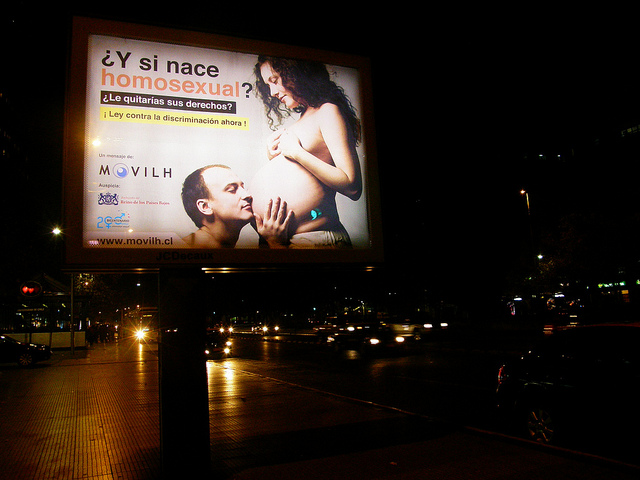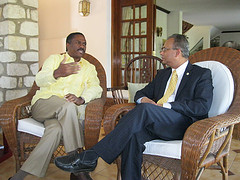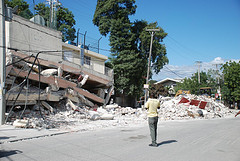
Chile, Dispatches
Chile’s Sebastián Piñera Struggles To Keep Support After Mine Rescue
January 11, 2011 By Patrick Burns
“Some of his advisers told him at the beginning of the disaster to not go into this problem, to stay away and let the mine’s owner search by itself. They were sure that these guys were all dead, so as a politician you cannot expect any good results from this,” explained Dr. Roberto Ampuero, a Chilean author and professor at the University of Iowa.
Yet Piñera, a notorious risk taker, rejected the advice and put his government in charge of the effort.
At the time, Patricio Navia, a professor of Latin American studies at NYU commented that “it would be impossible for [Piñera] to govern if the rescue operation fails.”
For the following 17 days there was no sign of life. Nearly everyone had given up. Then on August 22, the rescuers made contact. Piñera flew to the encampment to read aloud the now-famous handwritten note from below, “We are all well in the shelter, the 33.” It sparked one of the biggest news stories of the year, and images of the miners’ families cheering and hugging each other spread around the world.
His risky decision vindicated, Piñera’s approval rates began climbing. He also seemed to be winning over the blue collar denizens of rural Northern Chile, almost all of whom are somehow tied to copper mining, the country’s largest industry. The man who had often been seen as an out-of-touch billionaire took numerous trips to the Atacama Desert to greet the miners’ families and reaffirm his government’s commitment—“to look for the miners as if they were our own sons.”
In my interviews with dozens of miner families at Camp Hope, nearly all expressed unqualified support for the conservative president. “Piñera did a good job, and the government proved they really care,” said José Moya, 40, a friend of several of the trapped miners and a copper miner himself.
For Pedro Ávalos, 26, cousin of miners Florencio Ávalos, 31, and Samuel Ávalos, 43, Piñera’s presence at Camp Hope meant a lot. “My opinion of him improved,” he said. “He worked very hard, and he was here with the people in this important moment.”
But the honeymoon didn’t last. Just two months after he stood to embrace the miners aboveground, Piñera’s approval rate dropped to 50 percent, on par with levels prior to August. At the close of 2010, his numbers slid further, to 44 percent.
“The surveys show that Piñera didn’t get a free ticket forever—he has to continue working,” said Patricio Zamorano, a Chilean Senior Analyst at a Washington based advocacy NGO. “The Chilean people are not thinking about the miners anymore, they’re now focusing on the economy, the effects of the earthquake, inequality, wages, those issues.”
The government’s ongoing battle with Mapuche is one issue that took a back seat during the rescue saga. Few of the millions of people that had watched the rescue unfold in October were aware of months-long hunger strikes staged by 38 Mapuche in jails across the Southern Araucania region.
Chile’s largest minority, this indigenous group comprises about five percent of the population. They’ve blocked roads and staged strikes to reclaim ancestral territories and to protest a Pinochet-era Anti-Terrorism law.
Even with the media blackout on the hunger strike, the miners themselves were aware of the Mapuche struggle. Various miners had attempted to send a message expressing solidarity for the indigenous population. The note read, “Fuerza al Pueblo Mapuche,” or “support for the Mapuche community,” and it was among the messages the miners sent to the surface, according to the regional newspaper, La Tercera.
As proof of the extreme sensitivity surrounding the issue, government authorities did not release the message. Government censorship notwithstanding, the hunger strikes prompted Piñera to capitulate by recognizing a constitutional article ensuring common law protection for the Mapuche population. The issue is sure to remain a perplexing one for the president.
Economically, Chile has lived up to its “Latin Tiger” nickname. Since emerging from dictatorship, the country recorded 20 years of growth and in 2010 it became South America’s first member of the elite Organization for Economic and Cooperation and Development. Yet Chile is still technically a Third World country.
Poverty levels are high and economic inequality is comparable to levels in neighboring Brazil. Now with less political capital at his disposal, Piñera will find it tougher than ever to push through lasting reform.






3 Comments
Damned fine piece–thank you!
[…] With Chile’s 33 trapped miners safe and sound, President Sebastián Piñera now struggles to retain his popularity. Latin America News Dispatch contributor Patrick Burns reports. […]
Nicely reported piece, with a first-person reference. Why no by-line? Don’t we need to know who wrote this partly personal account? Just a quibble. I love what you are doing with this site. It recalls the Latin America Newsletter published by Stanford’s Latin American Studies masters students in the 60s–which scooped the world at one point on the impending invasion of Cuba. Print back then, web now, and still a great idea. Congratulations.
John Dinges
Comments are closed.